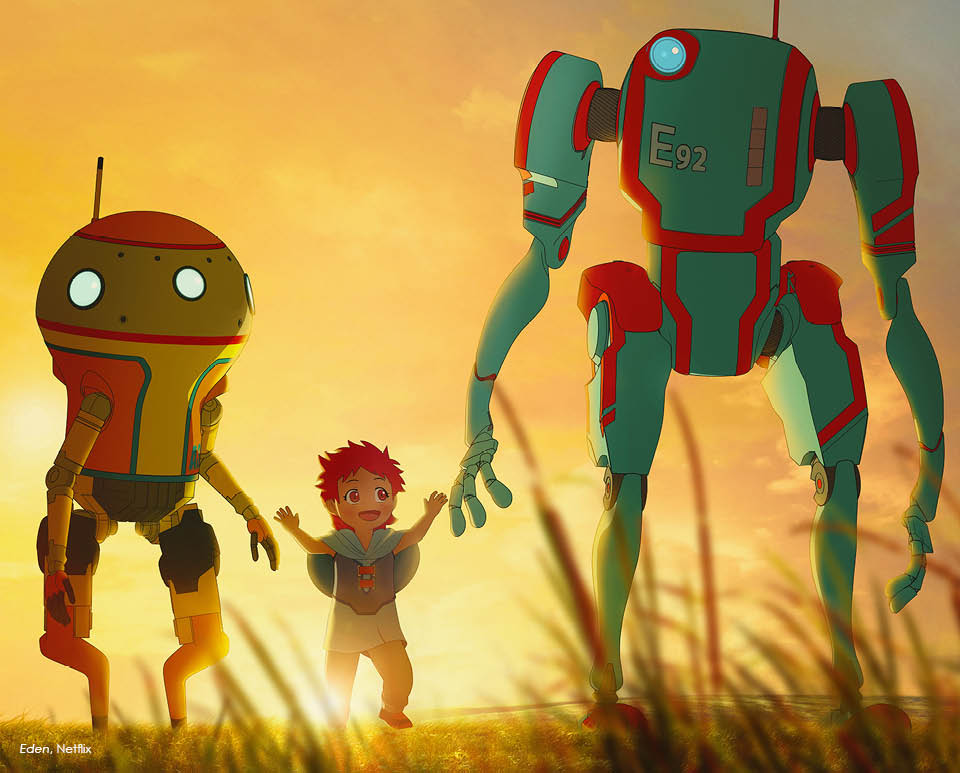
Netflix has supersized its Japanese content slate, going from a handful of alliances two years ago to its own two soundstages, and is spending hundreds of millions of dollars on anime and other originals that load everything from reformed yakuza and zombies to dark forces and robots who raise a human child onto the platform.
On the eve of this year’s second Mip TV Online, Netflix debuted comedy slice-of-life animated series, "The Way of the Househusband", about legendary former yakuza Tetsu “The Immortal Dragon”, who tries valiantly to renounce his past. The series is part of a turbocharged Japanese slate that loads almost double the number of original anime titles onto the platform this year compared to last year, the global streamer said during the recent AnimeJapan in Tokyo.
The premiere of "The Way of the Househusband", based on a popular comic, comes less than a month after Netflix announced its lease of two Toho Studio soundstages, along with at least 25 Japanese original live action and anime titles scheduled for 2021. These will stream alongside 40 new anime titles on the schedule across 2021, including the June debut of "Record of Ragnarok", about an epic fight between 13 gods and 13 humans for the fate of humanity.
Other Japanese titles this year include "Resident Evil: Infinite Darkness" (no release date yet) about zombies at the White House; "Yasuke" (29 April 2021), about a great ronin who takes up his sword to protect a mysterious child being hunted by dark forces; and the futuristic "Eden" (27 May 2021), about two robots who accidentally awaken a human child in a city that believes humans are nothing more than an ancient myth.
Both "Eden" and "Yasuke" are brand new stories created by international teams both in and outside of Japan.
Netflix’s decision to super-size its output in Japan has been widely welcomed, with some saying the move potentially throws down the gauntlet not only for local platforms and other streamers with Japanese ambitions but also for dedicated services built upon cult-like anime audiences around the world as well as for local broadcasters suffering shrinking budgets amid tough economic conditions.
“Our economy is shrinking and so are our b...
Netflix has supersized its Japanese content slate, going from a handful of alliances two years ago to its own two soundstages, and is spending hundreds of millions of dollars on anime and other originals that load everything from reformed yakuza and zombies to dark forces and robots who raise a human child onto the platform.
On the eve of this year’s second Mip TV Online, Netflix debuted comedy slice-of-life animated series, "The Way of the Househusband", about legendary former yakuza Tetsu “The Immortal Dragon”, who tries valiantly to renounce his past. The series is part of a turbocharged Japanese slate that loads almost double the number of original anime titles onto the platform this year compared to last year, the global streamer said during the recent AnimeJapan in Tokyo.
The premiere of "The Way of the Househusband", based on a popular comic, comes less than a month after Netflix announced its lease of two Toho Studio soundstages, along with at least 25 Japanese original live action and anime titles scheduled for 2021. These will stream alongside 40 new anime titles on the schedule across 2021, including the June debut of "Record of Ragnarok", about an epic fight between 13 gods and 13 humans for the fate of humanity.
Other Japanese titles this year include "Resident Evil: Infinite Darkness" (no release date yet) about zombies at the White House; "Yasuke" (29 April 2021), about a great ronin who takes up his sword to protect a mysterious child being hunted by dark forces; and the futuristic "Eden" (27 May 2021), about two robots who accidentally awaken a human child in a city that believes humans are nothing more than an ancient myth.
Both "Eden" and "Yasuke" are brand new stories created by international teams both in and outside of Japan.
Netflix’s decision to super-size its output in Japan has been widely welcomed, with some saying the move potentially throws down the gauntlet not only for local platforms and other streamers with Japanese ambitions but also for dedicated services built upon cult-like anime audiences around the world as well as for local broadcasters suffering shrinking budgets amid tough economic conditions.
“Our economy is shrinking and so are our budgets... with the rise of Netflix, Amazon and Disney’s Star, which starts service this summer, I’m sure most if not all production houses will be making their pitch to global powerhouses,” one veteran Japanese TV exec tells ContentAsia.
Insiders note, too, the boost Netflix’s new sound-stage deal gives to Toho, which has been accused of largely languishing in entertainment nowheresville, risk averse and focused on its real-estate business.
The Toho agreement is also seen as positive for local production companies and freelance creators as well as talent agencies, particularly if Netflix greenlights its trademark edgy, high-budget projects.
Japanese original titles that have paved the way for Netflix’s latest move include "The Naked Director" and "Alice in Borderland", which in turn has paved the way for industry optimism about Netflix as a producer of premium content other than anime.
“I hear lots of ideas are materialising and are being green-lit. To do so, they are recruiting more and more local TV people, including creators, in order to strengthen their local produced original content structure... Netflix has been hiring for some time now, but they are now recruiting non-English speakers also... I guess they don’t have much other choice considering the growing demand,” ContentAsia was told in the days following the 18 March announcement.
Online response to local reports about the Toho deal ranged from “kind of heart-warming... to see Netflix and Toho paired in headlines”, to questioning how Japanese platforms would rise to the challenge of heightened level of competition.
Netizens on local platform nowtice.net added comments such as the “Japanese movie industry feels like the clock stopped with Seven Samurai from the black-and-white movie era”; and “the treatment of Japanese super animators has been greatly improved, and the best way to stop the number of wasteful animation productions is to rely on the power of foreign capital and crush stupid domestic production companies”.
Netflix has not disclosed its content/production budgets for Japan. But the upsized Japan focus is likely to break through the commonly touted number of US$1 billion content spend across Asia for 2021.
Netflix’s latest initiative also puts it on course for 20% penetration of Japanese homes, up from the current estimate of 11%, according to regional research specialists, Media Partners Asia (MPA).
Based on previous disclosures, ContentAsia estimates that Netflix will spend about US$900 million on Korea and India this year.
In February 2021, Netflix said it would spend US$500 million on Korean content this year. The 2021 content figure for India could be US$400 million, based on amounts Netflix says it spent in previous years and its production plans for this year. So far this year, Netflix has announced 41 India titles, which more than doubles 2019’s output of 20 films/series, and is a significant increase from last year’s 28 titles. In 2019 and 2020, Netflix says it spent a total of US$400 million on content in India.
If Korea and India are spending a combined US$900 million, and Japan is, as Netflix claims, a major market, the Japan content budget is likely to be way higher than the relatively paltry US$100 million balance left from previous estimates of US$1 billion content spend in the region.
This is the second year Netflix had made giant leaps forward in its Japan strategy. In January 2020, the streamer said it had secured rights to 21 Studio Ghibli films. The deal was rumoured to be worth US$100 million.
At the same time, Netflix said it was expanding its commitment to anime across the global platform, working with creators like Shin Kibayashi ("The Kindaichi Case Files") and Yasuo Ohtagaki ("Mobile Suit Gundam: Thunderbolt") on original productions. This followed 2019 alliances with Anima (Altered Carbon: Resleeved"), Sublimation ("Dragon’s Dogma") and David Production ("Spriggan"), as well as deals with Production I.G ("Ghost in the Shell: SAC _2045", premiered in 2020) and Bones ("Super Crooks", scheduled for 2021) in 2018.
At the time, Netflix said it aimed to be “the most compelling and attractive home for anime fans, creators and production studios. We are creating an environment where production houses can do their best work”.
Two years later, there may be a question about a decision here and there, a raised eyebrow about a hiring or firing, but on the whole, we couldn’t find anyone who would bet anything on Netflix not sticking to that path.


















